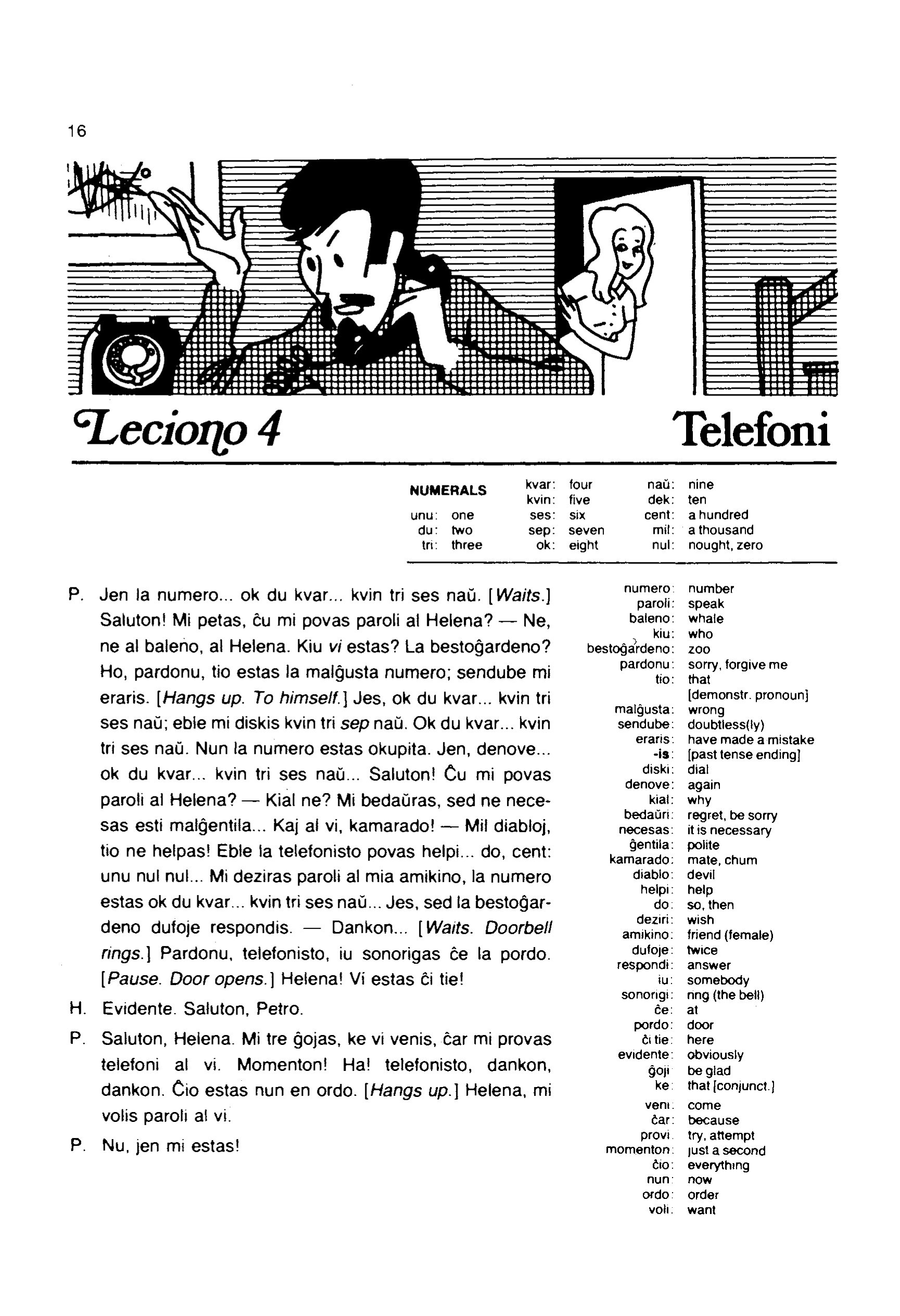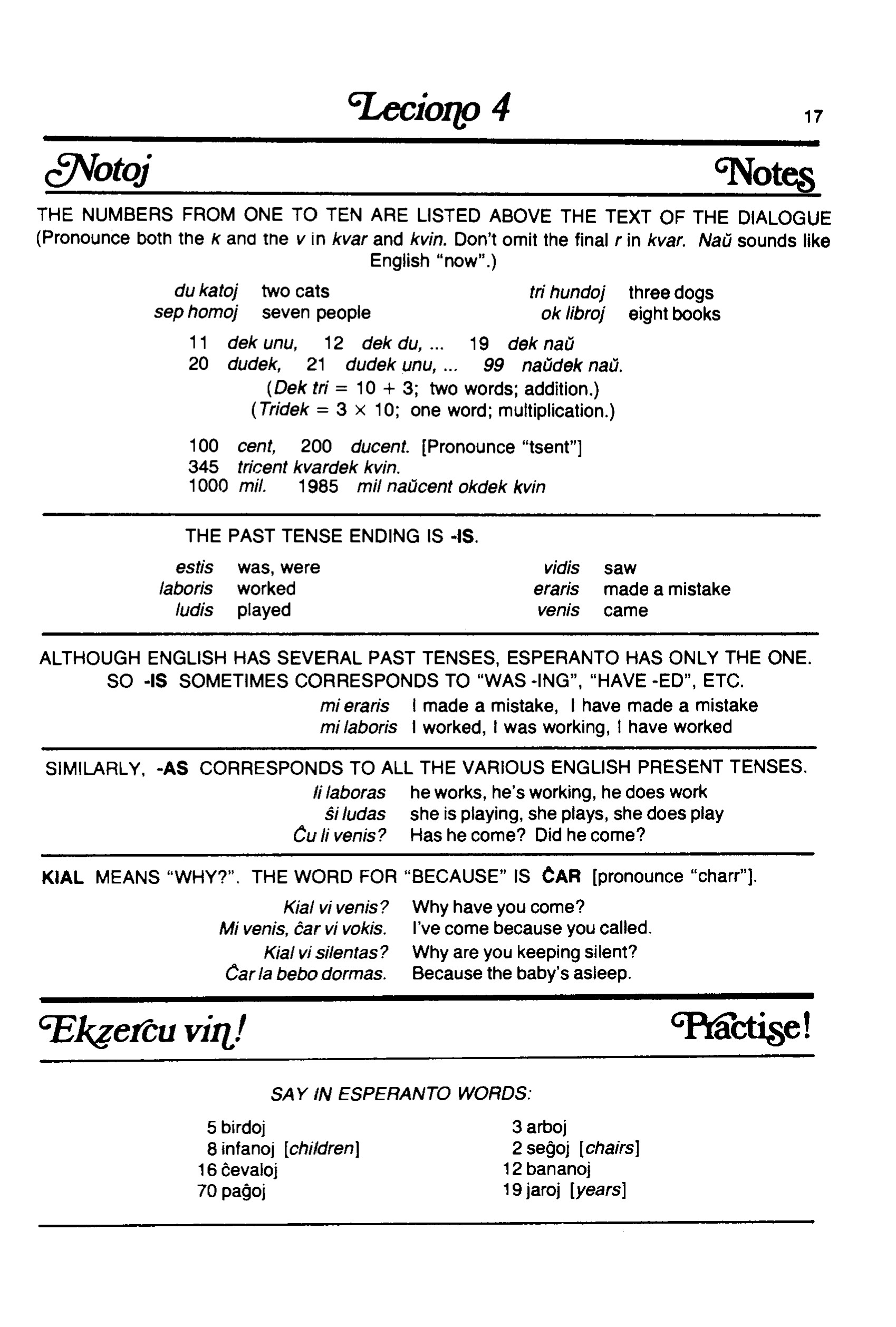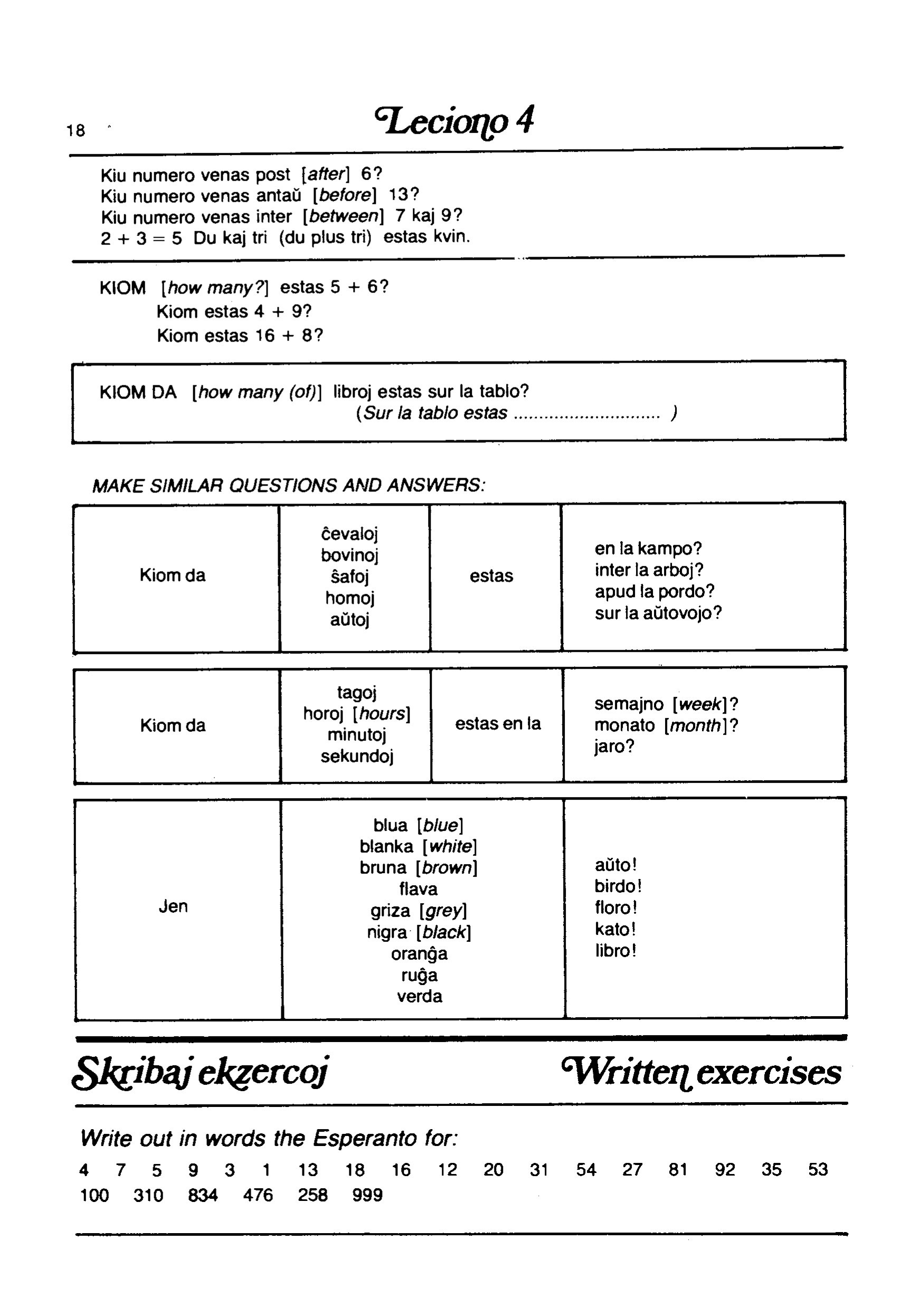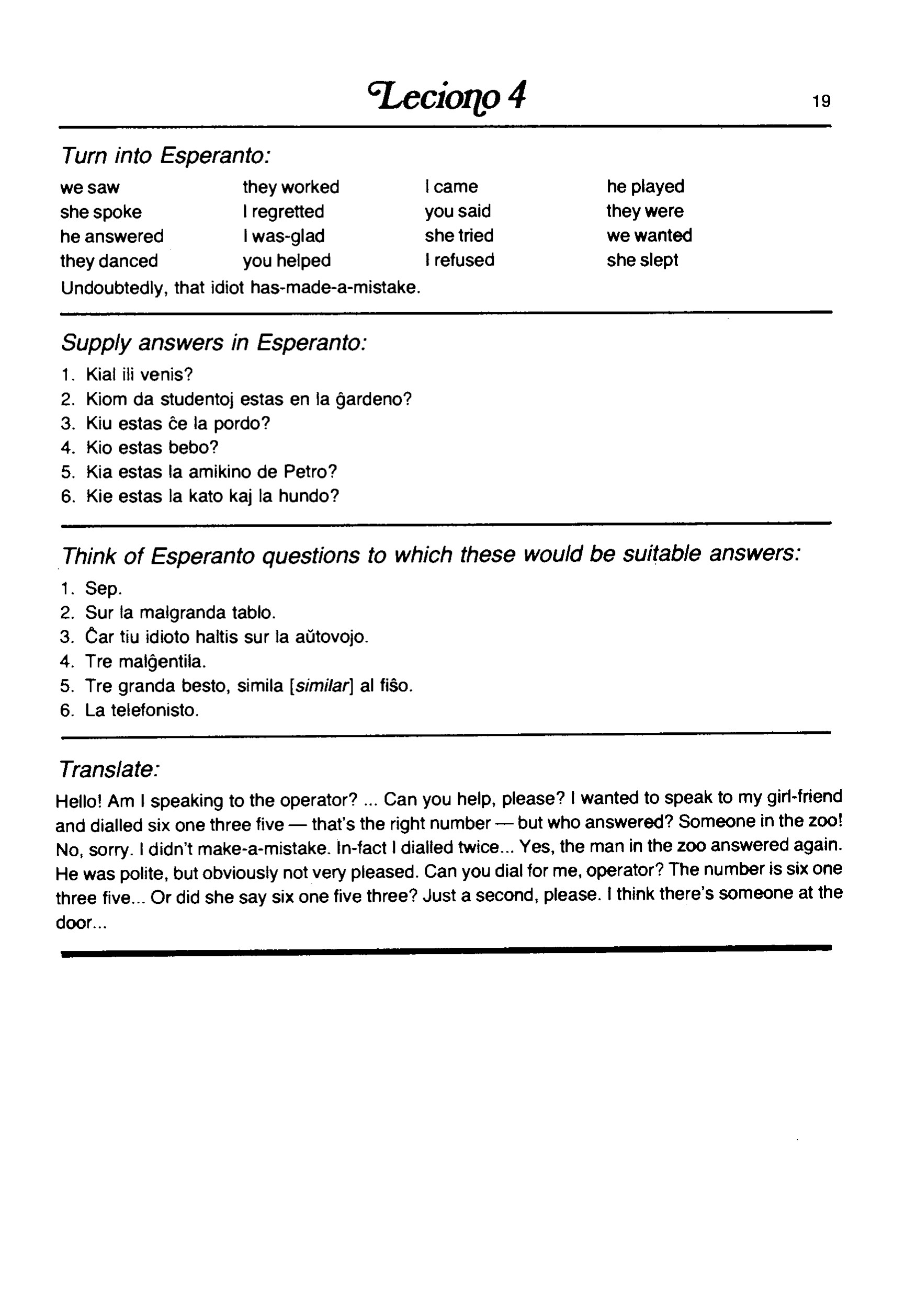


Dialogue



Answers are offered below
Did you write out ‘answers’ for Lesson 3? Add your new ones to them now. Has writing answers out paid any dividends? You can now read them back. Did you correct them where necessary? Writing is also visual. You see whether what you have written is correct or not, which will help you now. You will hear hints in the dialogues which you have not seen in the printed text. Make a note of any you hear. Have you written down the numbers up to twenty or even thirty? It is important to see the pattern. Notice there is no change at sixty or eighty! Don’t change the rhythm in speaking. Say ‘DEK DU, DEK TRI’ as separate words, which they are. Say ‘DUdek du, DUdek tri’ etc. Have you written down what year it is now in words? Note the difference from English.
Please attempt the exercises above before consulting the material below
Lesson 4
Example Answers / Ekzemplaj Solvoj
Ekzercu vin!
paĝo 17
Diru en Esperanto – Say in Esperanto
kvin [5] birdoj tri [3] arboj ok [8] infanoj [children] du [2] seĝoj [chairs] (16) dek ses ĉevaloj (12) dek du bananoj (70) sepdek paĝoj (19) dek naŭ jaroj
paĝo 18
Kiu numero venas post [after] ses [6]? – sep [7]
Kiu numero venas antaŭ [before] dek tri [13]? – dek du [12]
Kiu numero venas inter [between]sep [7] kaj naŭ [9]? – ok [8]
(2) Du kaj tri [3] [du plus tri] estas – kvin [5]
Kiom estas kvin [5] plus ses [6]? – dek unu [11]
Kiom estas kvar [4] plus naŭ [9]? – dek tri [13]
Kiom estas dekses [16] plus ok [8]? – dudek kvar [24]
Kiom da ĉevaloj estas en la kampo?
Kiom da bovinoj estas sur la aŭtovojo?
Kiom da ŝafoj estas apud la pordo?
Kiom da homoj estas inter la arboj?
Kiom da aŭtoj estas sur la aŭtovojo
Kiom da tagoj [days] estas en la semajno [week]? – Estas sep
tagoj en la semajno
Kiom da horoj [hours] estas en la semajno? – Estas cent sesdek ok horoj en la semajno.
Kiom da minutoj estas en la tago? – Estas mil kvarcent kvardek minutoj en la tago.
Kiom da sekundoj estas en la horo? – Estas sesdek sekundoj
en unu horo.
Jen blua [blue] aŭto! Jen blanka [white, blank] birdo! Jen bruna [brown] kato! Jen flava [yellow] floro! Jen griza [grey] kato! Jen nigra [black] birdo! Jen oranĝa [orange] floro! Jen ruĝa [red] libro! Jen verda [green, verdant] aŭto!
Skribaj ekzercoj
4 – kvar 7 – sep 5 – kvin 9 – naŭ 3 – tri 1 – unu 13 – dek tri
18 – dek ok 16 – dek ses 12 – dek du 20 – dudek 31 – tridek unu 54 – kvindek kvar 27 – dudek sep 81 – okdek unu 92 – naŭdek du 35 – tridek kvin 53 – kvindek tri 100 – cent 310 – tricent dek 834 – okcent tridek kvar 476 – kvarcent sepdek ses 258 – ducent kvindek kvar 999 – naŭcent naŭdek naŭ
Note: there are no ‘ands’ used.
paĝo 19
we saw – ni vidis they worked – ili laboris I came – mi venis he played – li ludis
she spoke – ŝi parolis I regretted – mi bedaŭris you said – vi diris they were – ili estis
he answered – li respondis I was-glad – mi ĝojis she tried – ŝi provis we wanted – ni deziris
they danced – ili dancis you helped – vi helpis I refused – mi rifuzis she slept – ŝi dormis
Undoubtedly that idiot made a mistake – sendube tiu idioto eraris.
1. Kial ili venis – Ili venis ĉar ili deziris helpi.
2. How many students are in the garden? Estas ducent kvindek kvar studentoj en la ĝardeno
3. Kiu estas ĉe la pordo? Estas granda homo ĉe la pordo.
4. Kio estas bebo? Bebo estas tre juna homo.
5. Kia estas la amikino de Petro? La amikino de Petro estas tre bruna.
6. Kie estas la kato kaj la hundo? La kato kaj la hundo estas en la ĝardeno.
1. Kiom da ŝafoj estas en la kampo? Sep
2. Kie estas la nigra libro? Sur la malgranda tablo.
3. Kial ni ne povas vidi? Ĉar tiu idioto haltis sur la aŭtovojo.
4. Kia estas tiu studento? Tre malĝentila
5. Kio estas tre malgranda besto, simila [similar] al fiŝo. Rano
6. Kiu parolis al vi? La telefonisto.
Traduku /
Translate
Saluton! Ĉu mi parolas al la telefonisto? Ĉu vi povas helpi, mi petas? Mi deziris paroli al mia amikino kaj diskis ses unu tri kvin – tio estas la ĝusta numero – sed kiu respondis? Iu en la bestĝardeno. Ne, mi bedaŭras. Mi ne eraris! Efektive mi diskis dufoje. Jes, la viro en la bestĝardeno respondis denove. Li estis ĝentila, sed evidente ne tre ĝojis. Ĉu vi povas diski por mi, telefonisto? La numero estas ses unu tri kvin. Aŭ ĉu ŝi diris ses unu kvin tri? Momenton! Mi kredas, ke estas iu ĉe la pordo.
Lesson 4 Words to be learnt!
Adres/o
Ali/a
Alt/a
Amik/o
Ankoraŭ
Antaŭ
Aper/i
-as
Aŭ
Banan/o
Bild/o
Cent
Ĉapel/o
Ĉar
Ĉokolad/o
De
Dek
Dolĉ/a
Du
Fab/o
Ferm/i
Fiŝ/o
Flav/a
Frat/o
Freŝ/a
Frukt/o
Grand/a
Gust/o
Ĝarden/o
Ĝi
Ĝoj/o
Ili
Inter
Iom
-is
Jun/a
Kar/a
Kial
Kie
Kiom
Krajon/o
Kvar
Kvin
Lev/i
Libro/vend/ej/o
Lit/o
Mal
Matur/a
Mil
Mol/a
Naŭ
Nom/o
Nov/a
Nul
Ok
Paĝ/o
Permes/i
Plaĉas
Plank/o
Pom/o
Post
Prefere
Pren/i
Prêt/a
Riĉ/a
Rigard/i
Ruĝ/a
Saĝ/a
Sak/o
Sed
Sep
Ses
Simpl/a
Skatol/o
Sonor(ig)/i
Student/o
Ŝaf/o
Ŝerc/i
Tie
Tri
Tre
Tut/a
Tute
Vend/ej/o
Vent/o
Ver/o
Verd/a
Vir/o
Address
Other cf ally
High/tall cf altitude
Friend cf amicable
Still/yet
Before, in front of
Appear
-s, is -ing, does -,
Or
Banana
Picture cf German Bild
Hundred, 100
Hat
Because, for that reason
Chocolate
Of, from
Ten, 10
Sweet cf dulcid
Two cf duo
Bean
Close, shut
Fish
Yellow
Brother cf fraternal
Fresh
Fruit
Big
Taste cf gusto
Garden
It
Gladness, happiness
They
Between, among
Somewhat, a bit, rather
-(e)d, -t, was -ing, have -ed, did -,
Young
Dear cf kara mia
Why, for what reason
Where
How many
Pencil
Four, 4
Five, 5
Lift, raise cf levitate
Bookshop
Bed
Direct opposite of
Ripe cf mature
Thousand, 1000
Soft cf mollify
Nine, 9
Name
New cf novel
Nought, Nil, 0
Eight, 8
Page
Permit
Pleases
Floor
Apple
After, behind
Preferably
Take
Ready cf Pret A Manger
Rich
Look (at)
Red cf rouge
Wise cf sage
Bag cf sack
But cf sed (Latin)
Seven, 7
Six, 6
Simple
Box
Ring cf sonorous
Student
Sheep
Joke
There
Three
Very
Whole
Wholly, quite
Store cf vendor
Wind
Truth cf verity
Green cf verdant
Man cf virile